A huge blustery north wind started up in the night. Much banging and clattering of branches and loose sticks. Great for drying clothes on the line today, and great for blowing all the leaves we didn't rake up/burn/clean up on the weekend to someone else's block (not yard here in Aus, but block). The temperatures are warmer as a result. It was getting a bit frosty during the nights, but last night the temperature stayed at 18 C, a record for Melbourne for the end of May. The non-native trees are just about down to bare branches, and the views between the native trees over the mountain edges are spectacular.
I went "on" (not to, but on) camp with the grade 5 and 6 classes of Ferny Creek Primary School from Wednesday to Friday of last week. The camp had been rescheduled from late February, because of the danger of the bush fires.
We bused and drove in a northeasterly direction to a town called Glenrowan, the home of Ned Kelly, and then on to Beechworth, a beautiful, historic mining town. The drive up was through the bushfire affected areas, by Steels Creek and Dixons Creek. Here the road winds up through a huge gully, blackened ground for many kilometres, crowned by green fuzzed black eucalyptus trees before it flattens into rolling hills. The evergreen type trees were either a bronzy, browned colour, or burned and removed. The eucalypts are growing a bright green fuzz of leaves close to the tree trunks, and the ground had some green peeking through, but there was a lot of black. You may remember a picture or story of a wedding party in a pub parking lot, looking toward the huge fires. We drove by the empty yard along this journey. The road also goes through the vineyards of the Yarra Valley, so I did notice some familiar names -- Yalumba, de Bortoli, wines we've either tried in Canada or here in Australia.
There is currently a commission hearing submissions about the February bush fires. This is a way to get at the big picture of what happened, why the emergency calls were diverted to an office that was closed, how the emergency call system collapsed under all the calls, why the bush fire predictions didn't get to the Fire Chiefs in the potential danger areas, why people chose to stay and fight rather than flee. What's horrific to think is that, in some situations, people had no prior warning and didn't know they were in danger until they heard the roaring of the fire, too close to flee. I did hear that the Ferny Creek siren system, which we found quite intimidating at times, is unique to the CFA. Because of the deaths here in 1997, the shire opted to install a warning siren system, and this is now being considered in other areas. No easy answers. But every bit of information will allow such tragedies to be avoided in the future.
Back to our trip... through the fire affected areas and the Yarra wine growing region, on to Glenrowan, the home of Ned Kelly, one of Australia's greatest folk heroes. A while ago, I asked Heather, Nicole's grade 6 teacher, why there is such a huge emphasis on Ned Kelly and the Bushrangers. At the time, Heather didn't know how to answer my question. I was thinking of Louis Riel, and wondered what social and historical impact this Australian criminal had on the history of the fledging country. Riel was branded a traitor, and executed for his efforts to fight the English power structure and prevent the army from taking over what rightfully belonged to the Metis people in western Canada.
The Kelly children were labelled "diseased stock" by the police in Melbourne. A telegram was sent from Melbourne police, warning the police in the family's new settlement, when the Kelly family moved to Glenrowan, into the hills 170 kilometres northeast of the city in the 1860s. The son of an Irish Catholic man convicted for stealing 2 pigs in Ireland (recall the potato famine, the starvation, the English landlords taking over Irish farms), Kelly had little chance to escape the attitudes of the English power structure in Australia. Constantly harrassed and watched by the local police, accused of a variety of crimes (stealing a horse when he was actually in another area), Ned's great act of saving another child's life barely acknowledged. Local English landowners wanted the land in the area for their sheep farms. They didn't want a group of grungy Irish "squatter" families interfering with their ability to acquire all useable farming land and stirring up the locals. The police were more than happy to support the powerful.
Things went from bad to worse, and the Kelly gang and their supporters had to hide in the hills following bank robberies in the towns of Jerilderie and Euroa. In Jerilderie, the Kelly gang took the loan papers from the bank and burned them all! As those were the only copies, the people owing money to the bank no longer had proof of their loans. A murder ultimately did occur -- of a police informant who had infiltrated their gang. His mother's defense of an attack on her daughter Kate by a local womanizer (another policeman), earned her 3 years hard labour with her tiny new infant. Ultimately the gang holed up in Glenrowan, hoping to sabotage a train of police constables from Melbourne. Two were killed outright, and several captured, including Ned. The trial was planned for Beechworth, but authorities realized quickly there was too much local support for him, so hastily moved him to Melbourne, where a kangaroo court convicted him in short order hanging him on November 11 in time for the judge, police, and other friends to enjoy the 1880 Melbourne Cup (the big horse race of the year) the following day. Desecration of his body followed, including the use of his skull as a paperweight by the premier of the state. In 1881-82, a Royal Commission into the Victorian Police Force changed the way police worked in that State. Approximately 80% of the police working at the time of Kelly's death were either dismissed, "retired", or pensioned off because of how they had handled the incidents in the Glenrowan and surrounding area.
In recent years, the case has been retried, with different results. Ned Kelly has moved from being a criminal to a folk hero, identifying issues of race, the way a new Australian state identified itself, social justice, and policing, among others. The Ferny Creek school kids sat transfixed through the presentation at Kate's cottage, a replica of the Kelly home, and asked some excellent questions. Heather and I talked about it later, and she said at the time of my question, she did not have anywhere near the information we received in Glenrowan.
From Glenrowan we went on to Beechworth, to our camp home at the Old Priory, a former working nunnery. From the 1850s onwards, a gold rush brought thousands of people to the area. Deaths were plenty, from the violence, filth and squalor of the gold field camps. We had a chance to visit the remains of the gold fields and pan for alluvial gold, view a variety of historic buildings, including the jail that housed Ned Kelly, visit the excellent Beechworth Bakery and the Lolly Shop (too many lollies by half!), walk the trail along the Gorge, and enjoy music and a bush dance one evening, with a disco on the second night. The kids were asleep a lot sooner on the second night, as was I!
Kerala Duck Eggs curry with flaky Paratha
-
Duck Egg Curry (an excellent way to start the day)
If you can't find Duck eggs, large chicken eggs are also fine.
3 hard boiled duck’s eggs, shelled ...
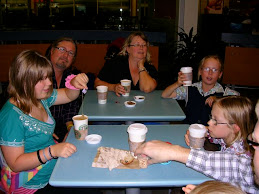

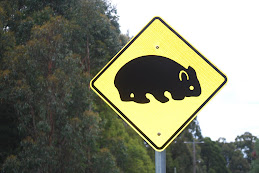

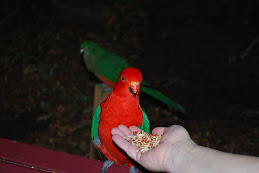
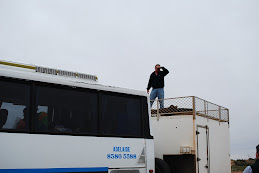




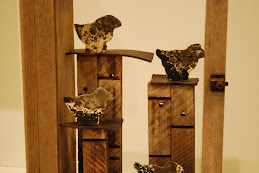

2 comments:
Thanks Brig. I really enjoy your updates. I think I knew only Ned Kelly's name and that he was a bandit. It's good to have the story rounded out a bit.
Indeed it is. I basically accosted Heather (poor woman!) one day (she can handle it) and couldn't figure out why Ned was so revered by the masses... I mean, people have replica masks in their homes, statues on their yards, etc. And the kids were more than happy to talk about the shooting, the banditry, etc. So it was a good learning experience for all of us. What they need to do next is exonerate the poor man. Shades of Louis Riel. Ned's only remaining brother died in 1946, and at one point told people he remained childless because he didn't think any woman would want to be with him...
There's another story in the making of this country, which is fascinating. How it is different than it's parent, England, and how it is forging it own path. And it's also far enough away from the U.S. that it can hold its own, or at least, with a lot of rigour. We are too close in Canada..
I will write more at a later date.
Post a Comment